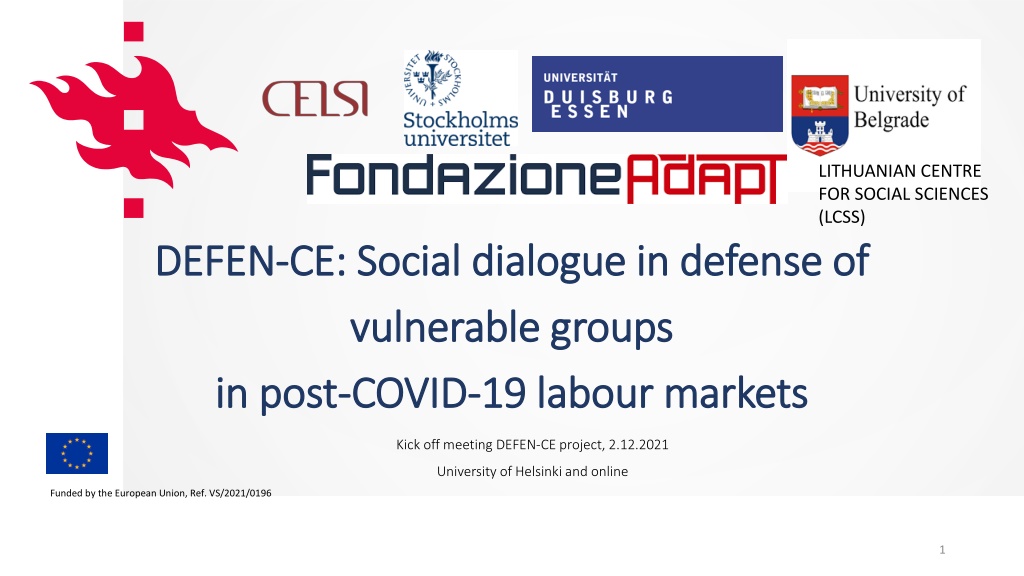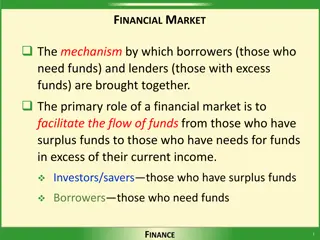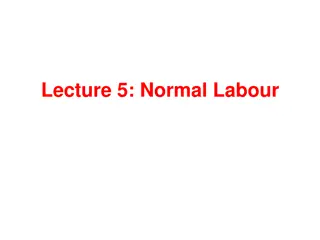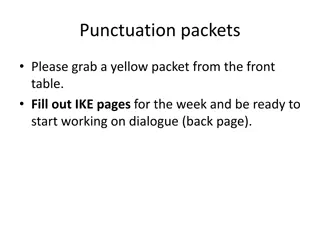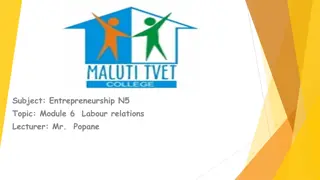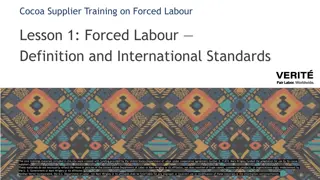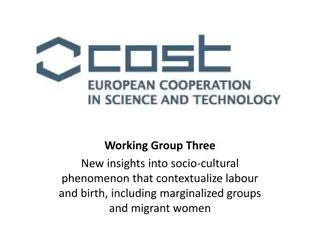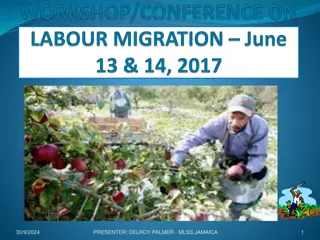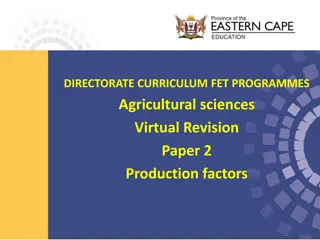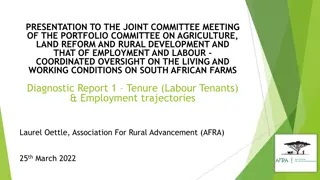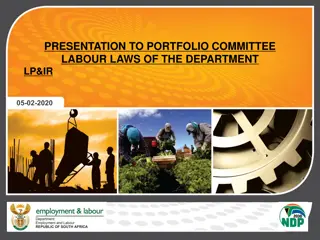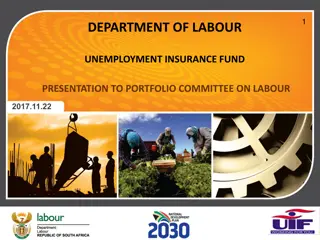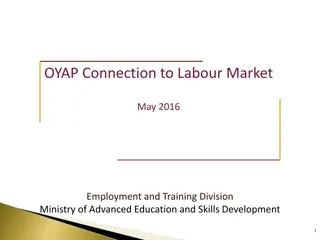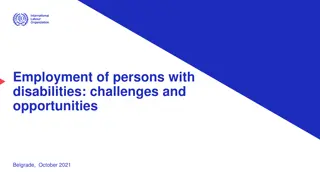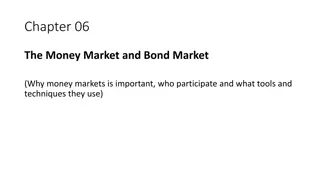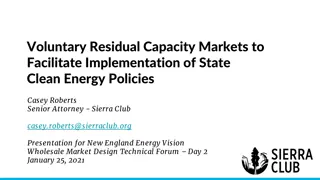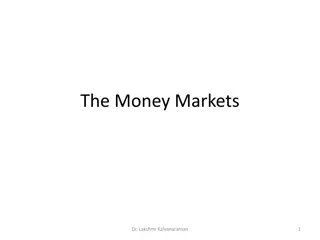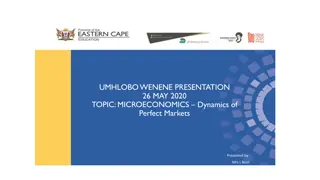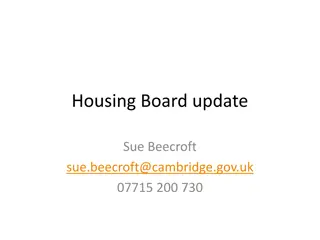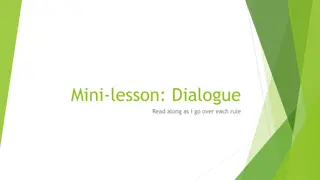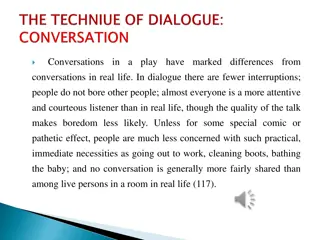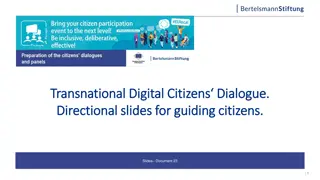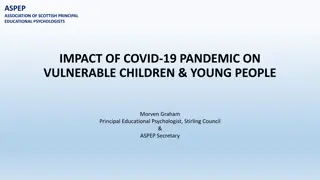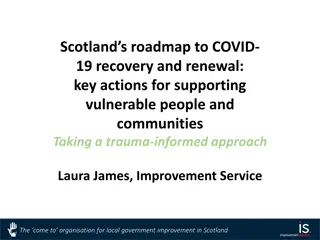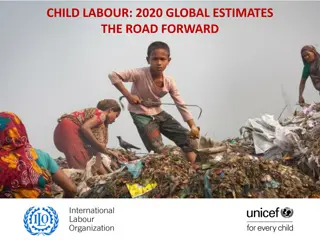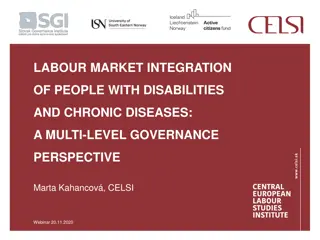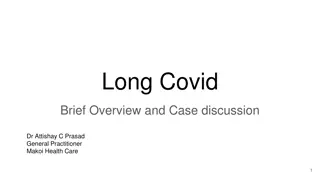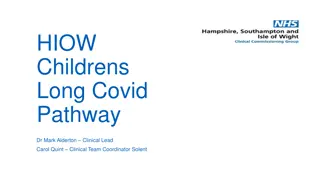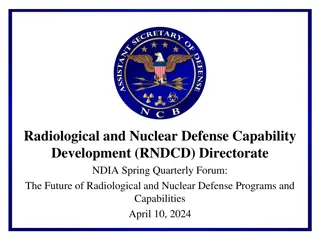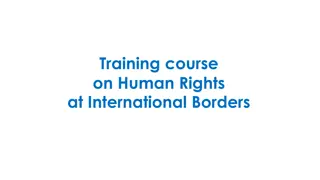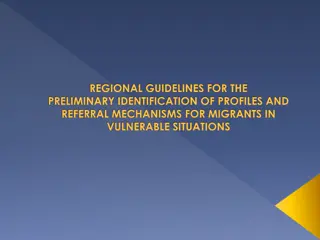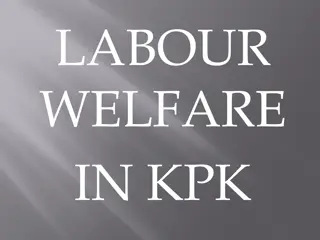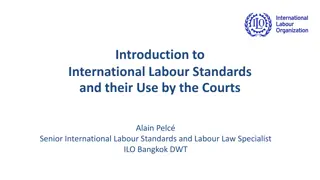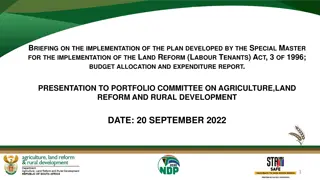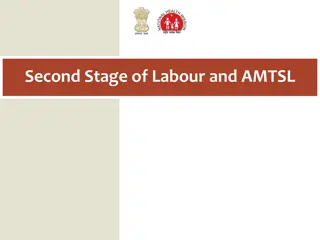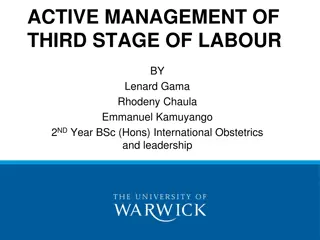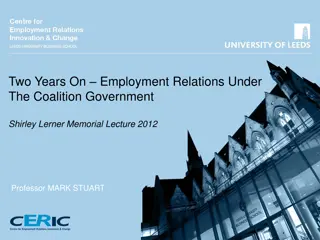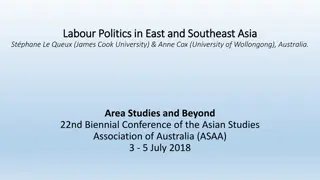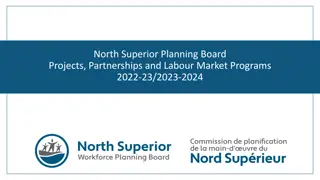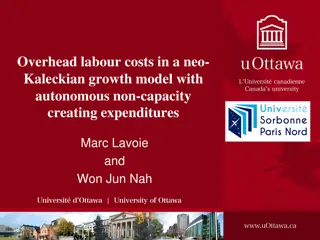Social Dialogue in Defense of Vulnerable Groups in Post-COVID-19 Labour Markets
The Lithuanian Centre for Social Sciences (LCSS) is hosting the DEFEN-CE project kickoff meeting at the University of Helsinki, focusing on social dialogue in defense of vulnerable groups in post-COVID-19 labor markets. The project aims to explore the role of social dialogue in addressing employment and social protection rights of vulnerable groups during and after the pandemic, with a regional focus on various European countries. Research questions include analyzing public policy measures targeting vulnerable groups, assessing the implementation of social dialogue in safeguarding employment rights, and identifying lessons for strengthening social dialogue across EU member states.
Download Presentation

Please find below an Image/Link to download the presentation.
The content on the website is provided AS IS for your information and personal use only. It may not be sold, licensed, or shared on other websites without obtaining consent from the author. Download presentation by click this link. If you encounter any issues during the download, it is possible that the publisher has removed the file from their server.
E N D
Presentation Transcript
LITHUANIAN CENTRE FOR SOCIAL SCIENCES (LCSS) DEFEN DEFEN- -CE: Social dialogue in CE: Social dialogue in defense vulnerable groups vulnerable groups in post in post- -COVID COVID- -19 labour markets 19 labour markets defense of of Kick off meeting DEFEN-CE project, 2.12.2021 University of Helsinki and online Funded by the European Union, Ref. VS/2021/0196 1
Programme (in CET time) 09:00 09.15 Opening welcome and introductions Opening welcome and introductions Minna van Gerven, HU, overall project coordinator of DEFEN-CE 09:15 10.00 Introduction of the project: research questions, aims and tasks, deliverables Introduction of the project: research questions, aims and tasks, deliverables Marta Kahancov , CELSI, scientific coordinator of DEFEN-CE 10:00 10:15 Project setup: timeline, deadlines, project meetings, division of tasks Project setup: timeline, deadlines, project meetings, division of tasks 10:15 10. 30 Coffee break 10:45 11:45 State of the art: Framework, methodology and data collection State of the art: Framework, methodology and data collection 11.45 12:30 Ethical issues and communication Ethical issues and communication 12:30 13:30 Lunch break, Restaurant SUNN, Aleksanterinkatu 27 (second floor) 13:30 14:30 Administration, reporting Administration, reporting 14:30 15:00 Discussion Discussion(including any outstanding issues) and closing (including any outstanding issues) and closing VS/2021/0196 DEFEN-CE Kick-off meeting, 2.12.2021 2
Introduction of the project Introduction of the project How does social dialogue play a role in addressing the employment and social protection rights of the vulnerable groups in the COVID-19 pandemic (and its aftermath) Innovative research design: novel EU-wide database + accession countries Serbia and Turkey Country case studies and their comparison, regional focus (Northern Europe, Baltic states, Western Europe, Central Europe, Southern Europe, Eastern Europe) EU-level study of social policy vis-a-vis vulnerable groups in response to COVID-19 Keywords Keywords: : vulnerable vulnerable groups groups, , pandemic pandemic measures measures, , social social dialogue dialogue
Research questions Research questions 1. 1. What What public vulnerable vulnerable groups during during the public policy groups, , were the COVID COVID- -19 policy and and social social dialogue were implemented implemented to 19 pandemic pandemic 2020 dialogue measures measures, , targeting to employment employment and 2020- -2022? 2022? targeting the and social the selected selected social protection protection 2. 2. To To what what extent implementation implementation of groups groups in in the extent and and how how did of social social and the COVID COVID- -19 did social social dialogue and employment employment rights 19 pandemic pandemic between between 2020 and 2022? dialogue play a play a role rights of 2020 and 2022? role in of selected selected vulnerable in the the vulnerable 3. 3. What What lessons strengthening strengthening social countries countries? ? lessons and and opportunities opportunities does social dialogue dialogue across does the across EU the COVID COVID- -19 EU member member states 19 pandemic pandemic yield states and and the yield for the candidate candidate for
Project aims Project aims Mapping public policy at national and EU-level in defense of the vulnerable groups upon the COVID-19 pandemic Mapping social partners strategies at national and EU level in defense of the vulnerable groups upon the COVID-19 pandemic Seeking interactions between social partners activities and policy making in tackling social and employment risks of vulnerable groups Promoting exchange of information for effective social dialogue between workers, employers and public authorities at national and EU level Understanding better the risks and opportunities for defending the vulnerable groups in the future Policy impact: gather evidence-based knowledge and recommendations for national and EU-level policy making Academic impact conferences and journal publications using the collected data
Defining vulnerable groups Defining vulnerable groups Figure: Policy structure of national Covid-19 policies vis- -vis particular vulnerable groups, 50 countries Definition based on LM segments - Women - Elderly - Migrants - Young people - People with disabilities/health issues - Ethnic minorities facing barriers in the labour market Definition of vulnerable groups from the perspective of labour market precarity - self-employed - People with several small-size contracts (especially when COVID-19 measures target a different structure of labour market participation) - Long-term unemployed - NEETS Source: Kahanec et al. 2020, CELSI COPREQ database
Conceptual Conceptual framework framework Actor centred institutionalism (schaprf 1997), in contexts of ideas, institutions and interests (Hall 1997) Power resources (Korpi 1989,2003): importance of political mobilisation, particularly the role and strength of labour mobilization explaining the different levels of policy development and efficiencies of social policies. The power resource theory is suited to analyse the differences in distributional rewards and policy preferences of different social classes, and therefore very useful for analysing policy processes and outcomes for the vulnerable groups Multilevel governance
Methodology Methodology Data Collection: Desk research available data on adopted COVID-19 policies, coverage all EU + Turkey and Serbia COPREQ database all EU + Turkey and Serbia Country case studies semi-structured interviews in 12 countries, focus on the role of social partners EU-level data: semi-structured interviews with EU-level stakeholders (hard/soft law, social partners) Data Analysis: Framework: actor-centered institutionalism, actors strategies and actions towards policy making and bargaining are embedded in certain institutional conditions Comparative dataset analysis (descriptive, simple coding, uncovering similarities/patterns across EU 27+2 countries) National cases in most similar country pairs: FI-SE, DE-NL, LT-LV, CZ-SK, ES-IT and national studies for SRB and TR Comparative analysis of all country cases (10+2) Data Dissemination: Website, social media 3 internal project meetings (Helsinki, Vilnius, Brussels), regular online research team meetings every 6 months Regional dissemination events (online) for pairs of countries for external stakeholders Academic publications, blogs
Covid Covid- -19 19 Policy Policy Response Response Questions Questions Database Database (COPREQ) (COPREQ) INSTRUCTIONS: Please fill in this CELSI COVID-19 Policy Response Questionnaire all substantive policies that have been adopted in your country to mitigate the COVID-19 pandemics and its social and economic impacts on the society. Please fill in the questionnaire retrospectively, back to the beginning of the COVID-19 health crisis in your country, and continue adding new policies as they are adopted until the crisis is over. Please describe minor updates in "ANY OTHER REMARKS AND MINOR UPDATES". Please enter major updates of existing policies as a new entry in a new row. CELSI COPReQ Please use one row per policy. In case a single piece of legislation or regulation enacted a number of various policies, please use one row for each of these policies. Please send any questions to: Martin.Kahanec@celsi.sk COUNTRY: SLOVAKIA Filled in by: NUMBER Lucia Kov ov POLICY SPONSOR TYPE SCOPE OF COVERAGE TARGET SOCIAL PARTNER INVOLVEMENT ENACTMENT DATE START DATE END DATE PLANNED END DATE ACTUAL SHORT DESCRIPTION WEB LINK ANY OTHER REMARKS AND MINOR UPDATES Title Who adopted the policy? Select one; the main, if there are more Select the primary one Select one Select the primary target group Involved social partners Level of involvement Policy adopted on DD/MM/YY Policy effective as of DD/MM/YY Initially planned to be discontinued as of DD/MM/YY, or "open" Discontinued as of DD/MM/YY, or "ongoing" Objectives, budget/funding, main body responsible for the implementation, any details complementing/detailing the information in the previous columns Official website or reliable media Both trade unions and employers or employers' associations Employees in ordered quarantive receive 40% of their wage from the employer, the costs are fully refunded to employer from the state budget. Implemented by the Ministry of Labor. Social partners consulted only ad hoc, tripartite meeting not held. The policy is seen as insufficient by most commentators Compensation for quarantined employees Executive branch, president, government Income maintenance scheme Workers/employe es EXAMPLE National National, federal 01.03.20 05.03.20open ongoing www.link.sk http://www.uvzsr.sk/index.php?option=com_content& view=article&id=4132:covid-19-zavery-z-rokovania- vlady-sr-a-ustredneho-krizoveho-tabu-sr-povinnos- nosenia-ruok-na-verejnosti-zatvorenie-obchodov-v- nedeu-vyleneny-nakupny-as-pre-seniorov-otvorenie- vybranych-prevadzok-v-obchodnych-domoch- karantenne-opatrenia-a-pod&catid=250:koronavirus- 2019-ncov&Itemid=153 None of the above (Please specify in column "short description" if any other actors have been involved) Other major social distancing measure (e.g. mandatory home office, cap on public gatherings) National Non-essential shops and business venues must be closed Other (Please specify in column "short description") Executive branch, president, government General population All the business venues and shops must be closed, except for essential ones such as grocery stores, gas stations, pharmacies, etc. 1 15/03/2020 16/03/202022/04 ongoing None of the above (Please specify in column "short description" if any other actors have been involved) Mobility restrictions during the Easter holidays includes: citizens are not allowed to move outside their place of residence and move to another district which different than a place of residence. Exceptions: commuting to work, shopping (food, pharmacy products) for self or dependants, accessing health care services, attending funeral, etc. Lock-down during the Easter Holiday and restricting the right to assembly Lock-down, curfew (national, local, municipal) Other (Please specify in column "short description") Executive branch, president, government General population 2 National 06.04.20 08.04.202014/04/2020 14/04/2020 None of the above (Please specify in column "short description" if any other actors have been involved) Local, municipal (Please specify in column "short description") Other (Please specify in column "short description") Selected Roma settlements are in lockdown due to the incidence of the infected inhabitants. The residents of these settlements are not allowed to move outside the settlement. At the same time, massive testing have been launched and infected persons have been placed in the state quarantine. Lock-down, curfew (national, local, municipal) Other (Please specify in column "short description") Lock-down in the selected Roma settlements Executive branch, president, government 3 08.04.2020 09.04.2020 01.05.2020ongoing
START MONTH DURATION (MONTHS) TASK NAME END MONTH WP1: ANALYTICAL FRAMEWORK T 1.1 Literature review and conceptual framework T 1.2 Preparation of surveys and interviews D1.1 Working paper on literature, conceptual and analytical framework D1.2 Templates for questionnairs D1.2 List of variables for COPReQ WP2: T2.1 Establishing and coordination of the Network of experts T.2.2 Review and redevelopmet of existing COPReQ datase T2.3 Data collection new COPReQ (national level) T2.4 Analyzing new data D2.1 Open access dataset D2.2 Working paper of EU-wide analysis D2.3 Policy brief findings of EU-wide database WP3: CASE STUDIES (NATIONAL LEVEL) T3.1 Semi-structured interviews T3.2 Transcription T3.3 Data analysis (exploration) T3.4 Data analysis (analysis) D3.1 Policy Paper: 5 comparative policy papers and 2 single-country analysisi D3.3 Policy Brief: based on 5 comparative policy papers and 2 single- country analysis D3.4 List of stakeholders WP4: CASE STUDY (EU LEVEL) T4.1 Interviews at EU level T4.2 Transcripts T4.3 Data analysis T4.4 Synthesis for the overview report D4.1. Working paper EU D4.2 Policy brief EU D4.3 List of interviewed stakeholders EU D4.4 Final overview report 1 1 7 7 7 7 1 1 1 7 1 7 7 7 7 DATABASE 1 1 8 11 14 15 15 3 7 3 7 3 4 1 1 1 10 14 14 15 15 Work Work packages and packages and deliverables deliverables 8 14 16 19 15 15 18 22 7 2 3 3 8 22 14 21 8 22 15 1 7 11 14 20 23 20 20 18 24 16 15 22 24 20 20 18 24 6 2 3 2 1 1 1 1
WP5:DISSEMINATION T6.1 Website and sharing folder, social media T5.2. Video on comparative results T5.3 Video on the EU findings T5.4 Project meetings T5.5 Regional dissemination events: T5.6 Direct dissemination of project findings 1 22 22 6 23 20 3 3 2 2 23 23 24 24 24 2 5 after the project end 24 24 24 24 after the project end 24 2 1 24 T5.7 Academic publications, blogs, and media articles D5.1 Project website and social media infuencing D5.2 Video dissemination D5.3 Project meetings interim D5.4. Kick off and final conference D6.5 Regional online dissemination of written/audiovisual project outcomes to relevant national and EU-level stakeholders D5.6 Academic publications, blogs and media articles WP6: MANAGEMENT AND QUALITY CONTROL T7.1 Management of project activities and communication between partners T7.2 Kick-off meeting 1st interim project meeting 2nd interim project meeting 3rd interim project meeting 4th interim project meeting 7.3 Quality control D7.1 Minutes/attendance sheets from progress meetings D7.2 Signing the agreement with the EC and project partners, reporting to the EC 24 1 23 6 2 Work Work packages and packages and deliverables deliverables 23 24 24 24 2 1 1 2 6 12 18 22 1 1 24 2 6 12 18 22 24 24 24 1 1 1 1 1 24 24 1 24 24
Project set Project set- -up up: : timeline timeline, , deadlines deadlines, , tasks tasks WP1: Conceptual framework, interview guides, guides for database update (M7) WP2: Database update (M15) WP3: Country case studies (M8-15) - policy papers (comparative, pairs of 2 countries) + national policy briefs (English & nat. language) M22 (8/23) WP4: EU-level analysis (M8-17) - EU working paper, policy brief M20 (6/23), Overview report database M24 (10/23), overview policy papers M24, synthesis all results M25(11/23) WP5: Dissemination of project findings Short video results M 23-24 (10/23) Regional dissamination events Online M23-M25 (9-11/23) EU dissemination M23-25 WP6: Project management Steering committee (1 person from each partner) meets 4 times
Coordination Coordination - - Division of Division of tasks tasks HU/TAU coordinates CELSI scientific manager HU case studies /CELSI database w SU All partners responsible for the national cases & reguired collaboration for the comparative cases & dissemination As indicated in the proposal
Project set Project set- -up up: : Meetings Meetings 2.12.2021 4.2022 10.2022 12.2022 4.2023 9-10/2023 9-10.2023 11.2023 11.2023
State of State of the the art art: : partners partners roundtable roundtable 1) which groups most affected by COVID-19 measures, 2) which measures taken, 3) what has been the role of social partners
Case Case studies studies RQ to what extent and how did national social dialogue play a role in the to what extent and how did national social dialogue play a role in the implementation of social and employment rights of selected vulnerable implementation of social and employment rights of selected vulnerable groups groups in the COVID in the COVID- -19 pandemic between 2020 and 2022? 19 pandemic between 2020 and 2022? RQ What lessons and opportunities does the COVID RQ What lessons and opportunities does the COVID- -19 pandemic yield for strengthening social dialogue across EU member states and the candidate strengthening social dialogue across EU member states and the candidate countries? countries? 19 pandemic yield for Interviews of relevant stakeholders and analysis of the data with indicative Interviews of relevant stakeholders and analysis of the data with indicative and deductive coding and deductive coding
Tasks Tasks and and deliverables deliverables WP3 (and 4) WP3 (and 4)
Tasks Tasks and and deliverables deliverables WP3 (and 4) WP3 (and 4)
Ethical Ethical issues issues and and communication communication Ethical committee clearance needed for interviews (and publishing) Issued by HU, but does this suffice for all partner institutions?
At HU, At HU, the the ethical ethical committee the the following following documents committee requires documents requires 1. 1. Cover letter. Cover letter. Justification for the request for an opinion and contact details of the person responsible for the study and the signature of the investigator-in-charge. Rationale for a Research Ethics Request Form. Rationale for a Research Ethics Request Form. An example of the Research Ethics Request Basis Form is available online. Research plan and its summary. Research plan and its summary. In the case of an English-language study, the abstract must be submitted in Finnish or Swedish. Evaluation of the ethics of the research by the person responsible for the research Evaluation of the ethics of the research by the person responsible for the research Notice to subjects. Notice to subjects. If the study deviates from the principle of informed consent, the reasons for the decision shall be set out in the evaluation of the ethics of the study. Consent form to be signed by the subjects. Consent form to be signed by the subjects. A consent form is required in addition to the bulletin if the research material is analyzed in an identifiable manner and the material contains sensitive information. Other material to be provided to subjects. Other material to be provided to subjects. For example, interview frame, diaries, questionnaires. Material Management Plan. Material Management Plan. Material processing, storage and archiving plan. Scientific Research Privacy Statement. Scientific Research Privacy Statement. Required as an annex to the request for an opinion, if the investigation collects any personal data and if identification is possible, for example by combining the data. 2. 2. 3. 3. 4. 4. 5. 5. 6. 6. 7. 7. 8. 8. 9. 9.
Communication Communication Teams site Monthly meetings (a regular time to be discussed)
Social Dialogue in Defence of Vulnerable Groups in Post-COVID-19 Labour Markets DEFEN-CE (GA: VS/2021/0196 ) Kick-off meeting 2.12.2021, Financial guidelines 06/10/2024 22
BUDGET: Own contribution (10%) Organization Labour costs Travel and DSA costs Services costs Administration costs Total direct costs Overhead 7% Total project budget Grant (90%) HU, Finland 102 070,00 13 623,50 55 640,00 1 400,00 172 733,50 12 091,35 184 824,85 166 342,36 18 482,48 CELSI, Slovakia 53 836,00 9 913,00 4 895,00 - 68 644,00 4 805,08 73 449,08 66 104,17 7 344,91 ADAPT, Italy 27 566,00 8 699,00 2 650,00 - 38 915,00 2 724,05 41 639,05 37 475,15 4 163,91 SOFI, Sweden 29 127,44 5 471,50 1 555,00 - 36 153,94 2 530,78 38 684,72 34 816,24 3 868,47 IAQ, Germany 47 600,00 5 794,00 1 655,00 - 55 049,00 3 853,43 58 902,43 53 012,19 5 890,24 UB, Serbia 20 700,00 5 555,50 1 430,00 - 27 685,50 1 937,99 29 623,49 26 661,14 2 962,35 LSRC, Lithuania 45 920,00 7 919,50 3 010,00 700,00 57 549,50 4 028,47 61 577,97 55 420,17 6 157,80 Total 326 819,44 56 976,00 70 835,00 2 100,00 456 730,44 31 971,13 488 701,57 439 831,41 48 870,16 06/10/2024 23
Reporting Project period: 1.11.2021 30.11.2023 Reporting periods (at the end of each period: Technical report, financial report) Period 1: 1.11.2021-31.10.2022 (declare expenses for P1 - 01/11/2021-31/10/2022) Period 2: 1.11.2022-31.10.2023 (declare expenses for P2 - 01/11/2022-31/10/2023) Period 3: 1.11.2023-30.11.2023 (declare expenses for P3 - 01/11/2021-30/11/2023) Documents and information must be delivered to the Coordinator within 30 calendar days following the end of each reporting period. all reports shall be submitted in the manner specified by Nordforsk The report should include an accounting report based on the Project Accounts financial reports by email to karita.kreander@helsinki.fi Please remember national funding rules 06/10/202 4 24
Reporting The financial statements must be drafted in Euros. Beneficiaries and affiliated entities with general accounts in a currency other than the euro must follow the rules indicated in the G.A. art. I.4. Since the Coordinator will have to declare that the information provided is full, reliable and true and the costs declared are the actual costs, signing the final financial statement submitted to the EC, each co applicant has to send all the SUPPORTING DOCUMENTS justifying the amounts introduced in its own financial statement. It is recommended to include the name of the project and the reference number of the grant agreement (project DEFEN-CE, VS/2021/0196) in all invoices related to the project (heading 2, 3, 4). VAT DECLARATION: VAT can be considered a cost if the entity doesn t recover it, according to specific legislation. The beneficiary must provide a signed declaration specifying the law under which the entity does not recover VAT. ALL THE SUPPORTING DOCUMENTS - COULD BE ASKED BY THE EU COMMISSION DURING THE EVALUATION OF THE FINANCIAL REPORT (DESK CHECK), SO EACH BENEFICIARY, AT REQUEST, HAVE TO SEND THEM TO THE COORDINATOR (if not already provided). - MUST BE KEPT FOR THE 5 YEARS FOLLOWING THE FINAL APPROVAL OF THE FINANCIAL REPORT, TO BE AT DISPOSAL FOR POSSIBLE EX-POST CHECK. 06/10/202 4 25
Reporting HEADING 1: staff costs (see pag. 9-11 of the Financial guidelines) - Timesheets to be drafted by each person involved in the action: according to the Financial Guidelines (pag. 11) Timesheets must be dated and signed by the individual concerned and validated by the employer. It is recommended to adopt a single timesheet encompassing the overall time worked by each staff member (not just the time worked by the employee on the particular EU supported action). While filling the timesheet, please, pay attention to the correct period of duration of each WP. - Staff unit cost calculation: (see pag. 10 of the financial guidelines) it must define the DAILY COST of each person involved in the project. You can use your own template to calculate the daily cost, but it is recommended to follow the structure of the form proposed by the EU Commission during the Desk Check (attached). - Payslips/Payroll reports for all the duration of the action (01/11/2021-30/11/2023), for each person involved. - Employment contracts (in particular for directly allocated staff or posting workers contracts, if any; but EU Commission can also ask them for permanent staff). 06/10/202 4 26
Reporting HEADING 2: travel, accommodation and subsistence costs (see pag. 11-12 of the Financial guidelines) - travel costs: travel agency invoices / documents for online reservation, if any (in these documents the amounts paid must be clearly specified) and tickets + boarding passes for each person/travel + payment statement -accommodation costs: hotel invoice mentioning day of stay and names of participants, detailed prices (per room/night). -Subsistence: two methods of reimbursement are possible: - flat rate (according to the legislation of each beneficiary country) or - real costs. but the option chosen must be kept all along the action and for all the travels. In each case, take into consideration the max amount of DSA (page 11 of the financial guidelines) and the calculation of the max amount recognized for each trip, according to its duration and venue. Please, remind that if catering services are provided by the organisers, the DSAs must be reduced accordingly: by 25% for each meal provided, and by 15% for breakfast. If real costs method is used, the travelling person must fill in a claim form asking for reimbursement to his/her entity, attaching all supporting documents related to the expenses supported (receipts of meals, tickets for local transports, transfer from and to the airport). Claim forms must clearly state the name of the project, the reference number of the Grant Agreement and the reason of the travel. Proof of payment of the reimbursement or the payment of the flat rate must be attached (ex: payslip, if the reimbursement is paid with the following salary). The supporting documents should be clearly organized and named, specifying: - the number of the Heading they refers to - the meeting and the venue - the name of the person travelling - the kind of expense 06/10/202 4 27
Reporting HEADING 3: costs of services (see pag. 12-15 of the Financial guidelines) Please, read carefully the paragraph Main procurement rules for the award of implementing contracts and subcontracting at page 13-14 of the financial guidelines and provide evidence of the respect of these rules (justifying the way you choose the suppliers). This heading includes the different kind of expenses. For each expense, please provide the invoice and related proof of payment. Information, dissemination, reproduction and publications Translations: since the application form requests the number of pages translated and the rate applied per page, please provide this information when filling the financial statement. Interpretation: Interpreters should be hired locally. For their travel and subsistence expenses to be covered by the grant, it must be impossible to hire them locally and it must be explained why this is so. External Expertise Others costs of service, such as coffee break/catering (please provide info about the number of people and price per person), transcriptions 06/10/202 4 28
Reporting HEADING 4: administration (see pag. 15 of the Financial guidelines) The budget only planned cost to hire rooms for meetings. Please, provide the invoice and related proof of payment 06/10/202 4 29
Pre Pre- -financing financing payments payments and and payment payment of of the the balance balance First pre-financing: An amount equivalent to 30% of the EC contribution to the Partners budget, referred to as the first pre-financing payment, shall be transferred to the Partners after signing Collaboration agreement, provided that the Coordinator has received the relevant prefinancing from the EC The coordinator must submit a request for the the second and third pre-financing payments within 60 calender days following the end of the first and second reporting periods. The coordinator must submit a request for payment of the balance within 60 calender days following the end of the last reporting period BUDGET TRANSFERS AND MODIFICATIONS The expenses supported during the action must be strictly connected to the work programme. Each modification to the work programme must be communicated to the EU Commission. When the modification imply expenses not planned in the granted budget, it could be necessary a budget amendment. So, if a beneficiary realizes that it needs money for something not planned, it must promptly inform the Coordinator and this last will inform the Commission, which will decide if a budget amendment is required. Transfers of unused budget are allowed from an heading to another, but only to increase voices of the budget already planned and granted by the EU. 06/10/202 4 30
Reporting ( Reporting (collaboration collaboration agreement agreement) )
Discussion Discussion Next meeting Online storage for files Tasks for the coming months 1-6 Internal cooperation agreement Ethical issues before conducting interviews
Thank Thank you you all all! !
